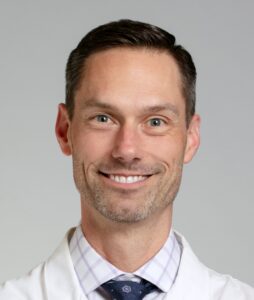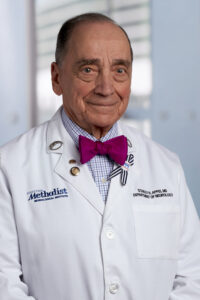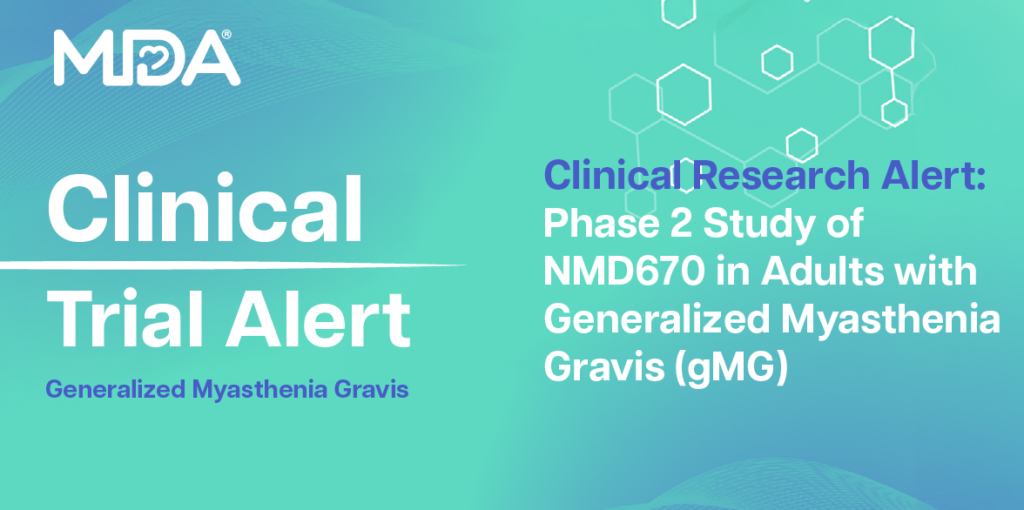
Why Multidisciplinary Care for ALS Yields Better Outcomes
By Chris Anselmo | Friday, April 25, 2025
For those living with neuromuscular diseases, including amyotrophic lateral sclerosis (ALS), access to quality care isn’t just important — it’s essential. The gold standard is the multidisciplinary care model, which is used at MDA Care Centers around the country.
A multidisciplinary care approach leverages the combined expertise of specialists across disciplines to provide coordinated, patient-centered care. This enables patients to see their care team at one location in one visit. Research shows that this model helps adult and pediatric patients achieve better outcomes.
What is multidisciplinary care?

Matthew Harms, MD, is a neurologist at the MDA Care Center at Columbia University.
The multidisciplinary care model brings various specialists together to provide comprehensive, holistic patient care. At MDA Care Centers, the care team is led by a healthcare provider specializing in diagnosing and treating neuromuscular conditions. They work with other healthcare providers to ensure the individual’s needs are addressed, both physically and emotionally.
According to Matthew Harms, MD, a neurologist at the MDA Care Center at Columbia University, most multidisciplinary care teams span several core functions.
“Multidisciplinary care creates a community of specialists who understand the nuances of what patients with ALS and other neuromuscular diseases need,” he says.
Depending on patients’ needs, multidisciplinary care teams may include any of the following specialists:
- Cardiologists, who manage heart health
- Dieticians, who offer advice on feeding and nutrition
- Geneticists and genetic counselors, who coordinate genetic testing and provide information and supportive counseling on results
- Occupational therapists, who help with activities of daily living
- Palliative care doctors, who address quality of life for those with serious illnesses
- Physiatrists (physical medicine and rehabilitation doctors), who specialize in the nonsurgical management of conditions that affect movement and function
- Physical therapists, who manage movement and pain
- Psychologists and social workers, who attend to emotional well-being
- Pulmonologists and respiratory therapists, who provide respiratory care and ventilation support
In addition, at MDA Care Centers, MDA Support Specialists offer hybrid support and resources to patients and families.
4 benefits of multidisciplinary care
The multidisciplinary care model benefits neuromuscular disease patients and clinicians in several ways:
-
Coordinated care
“At visits, the care team is on the same page, compares notes, and ensures that the patient receives comprehensive, holistic care,” says Dr. Harms. “This is important when cases are complex.”
When healthcare providers from different specialties come together, they can optimize the patient’s care. “Most multidisciplinary care teams meet at the end of the clinic day to share their insights for each patient for their specific area of expertise,” he continues. “That time is a really good opportunity to get a holistic picture of what’s happening with the person’s health and needs.”
-
Convenience
Because families often must travel for neuromuscular clinic visits, seeing the entire team of clinicians in one visit cuts down on the frequency of travel and costs. It also means patients don’t have to schedule separate appointments at different times with different providers.
Additionally, because the care team members talk to each other, there is less redundancy and a lower risk of important clinical information being misunderstood or lost in translation.
Reduced stress and discomfort for patients increases the likelihood that they’ll return for future visits to continue their care.
-
Clinical trials
When clinical trials are available for neuromuscular diseases, multidisciplinary clinics are well-positioned to administer them.
According to a 2017 research paper in the journal Muscle and Nerve, multidisciplinary care clinics “are often located in academic centers where neuromuscular research occurs, putting the clinic staff in a unique position to recruit patients into the most potentially impactful research.”
-
Improved health outcomes
The benefits of the multidisciplinary care model have been shown to improve health outcomes. The Muscle and Nerve research paper noted that several studies have shown that the quality of care delivered in multidisciplinary settings is consistently high and that quality of life and survival are better in neuromuscular populations treated in multidisciplinary clinics than in isolated neurological clinics.
Multidisciplinary care has the added benefit of reducing hospitalizations by proactively addressing potential complications and issues, such as helping patients obtain adaptive equipment or managing their pain.
Multidisciplinary care for ALS
“We know from carefully done studies that, for ALS patients, attending a multidisciplinary care center improves quality of life and shortens the amount of time to receiving the equipment they need,” says Dr. Harms. “Some studies have suggested that it even improves survival as we help to anticipate the potential complications that can come up for ALS.”

Stanley H. Appel, MD, founded the MDA ALS Research and Clinical Center at Houston Methodist Neurological Institute.
Complications can arise because ALS affects multiple organ types. “ALS is not just a disturbance of the neuromuscular system; it is associated with widespread inflammation and impaired breathing,” says Stanley H. Appel, MD, who founded the MDA ALS Research and Clinical Center at Houston Methodist Neurological Institute in 1982. “The more that patients understand the multiple systems involved and the fact that you need experts in each of these areas to contribute to your care, the better the patient is going to do and the more likely we are to enhance the quality of their life.”
Some forms of ALS progress quickly, so it’s important to take a preventive approach. “There are things multidisciplinary care teams can do today,” Dr. Appel adds. “You can enhance breathing. You can prevent falling. You can prevent choking and coughing. You can change the diet. … The goal is to deal with these problems before they arise.”
Focusing on preventive care and enhancing daily living function can make a big difference for ALS patients, especially as the drug development landscape evolves.
“With the trials going on and all that we’ve learned scientifically, we’re not that far away from making a difference by modifying progression of the disease,” Dr. Appel says.
How to find multidisciplinary care
MDA Care Centers around the country use the multidisciplinary care model to deliver care to individuals living with neuromuscular diseases, including ALS. There are 150+ MDA Care Centers at leading hospitals nationwide, including 47 MDA/ALS Care Centers.
Next Steps and Useful Resources
- Find an MDA Care Center that provides specialized care for ALS and other neuromuscular diseases.
- Learn about the types of specialists on MDA Care Center multidisciplinary care teams.
- Stay up to date on Quest content! Subscribe to Quest Magazine and Newsletter.
Disclaimer: No content on this site should ever be used as a substitute for direct medical advice from your doctor or other qualified clinician.




